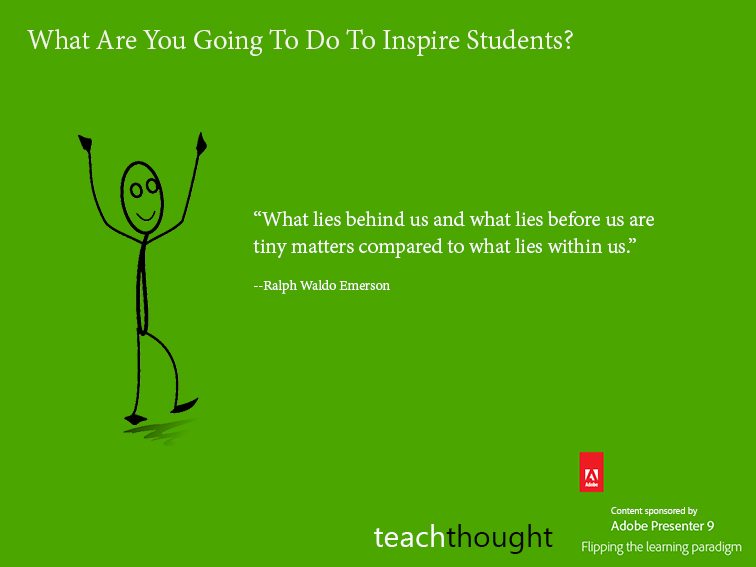 What Are You Going To Do To Inspire Students?
What Are You Going To Do To Inspire Students?
by Terry Heick
I got an interesting email recently from an organization that, among other things, is chiefly concerned with the idea of inspiration in education.
The theory is that education–as a system–may not be as broken as we fear; we’ve just failed to inspire students and teachers.
At first glance I disagreed, thinking that inspiration was more an effect than a cause. But the more I thought about it, the more I wasn’t sure. It is clear that it (inspiration) is mostly absent in schools. Past that, who knows? We could do a look like/sound like/feel like chart for inspiration to test for its attributes, but we know it when we see it. It can sometimes look like enthusiasm or joy.
It can be marked by creativity, innovation, or curiosity. Student-centeredness is also a part of it. (You’re not going to see a teacher-dominated classroom full of inspired students; the teacher’s enthusiasm is only useful as an initial catalyst.) And so I wondered further, on down the line from parents to the students to the teachers, trying to pinpoint where the breakdown in inspiration is.
See also Examples Of Student-Centered Teaching
Why don’t students come to school inspired to learn?
Is it the content? Is it all really that bad? Is it the testing, or do educators hate this part more than the students? Is it the lack of authenticity of the work we ask them to do? This has to matter. Artificial work that is by definition ‘academic’ and alien to the lives they live—that has to have an effect, right?
Maybe they’re spoiled? Unaware of the opportunity they have in front of them. Entitled. Coddled by over-protective helicopter parents, or left home alone by busy parents working two jobs to pay for a house full of expensive junk that they really don’t need.
And is technology accelerating the disconnect? Is it rotting their brains the way television did ours 25 years ago while intensifying the apathy by making it social and viral? Of course, the ‘answer’ (as if there’s one) can’t be pinned down, so we focus more on the stuff we can change: curriculum, assessment, and instruction.
That makes sense as a self-defense mechanism, but none of this gets at the missing inspiration. Learning is the iterative and personal act of becoming a human being through painful, joyful, and complex personal growth. A literal awakening that happens in your classroom because of your teaching and your content that you’ve designed. That’s pretty incredible.
But if acquiring knowledge and skills–improving what you know and can do–isn’t inspirational, something is missing. There is always going to be a generational gap marked by teenage rebellion and arrogant disdain for anything the adults say, but if students literally—en masse—aren’t inspired to learn, why aren’t more of us concerned?
And why are our responses so comparatively impotent? Lecture them? Play a sensationalized YouTube video that shows them their future is now? Dangle really cool carrot sticks?
This has been an issue in education for so long that you may have already told yourself that inspiration isn’t your job. That passion, curiosity, and a sense of urgency are prerequisites for school. That these are the kinds of things that students have or they don’t.
Parents blame the teachers, teachers (quietly) point back home while the students shift restlessly in their seats, pop their gum, and play on their phones with cracked screens.
You already give so much of yourself. You work diligently daily to manage dozens of unique personalities a day in pursuit of a common goal—a goal that you nor the students nor their families nor the administrators in your school had anything to do with.
But it’s your job and you do it anyway. What gets monitored gets done, and inspiring students doesn’t get monitored. Or assessed. And there are no standards for inspiration, and nothing can happen without standards. *cough*
Still, the question persists no matter how much you turn up your nose: What are you going to do to inspire students? Frequently you’re asked to assuage divergent objectives; you’re pulled in so many different directions, and you make it work anyway, somehow. But inspiring students—unless you’re a first or second-year teacher full of (naïve?) enthusiasm—that just doesn’t last. A cool lesson or project, maybe.
Or you can be a popular, funny, and engaging teacher.
But truly inspiring students every day, through the deadening trudge of a school year? Who can do that?
How does a teacher consistently model curiosity?
Design learning through play?
Promote passion and agency in learning?
Help students see their own social memberships in pursuit of self-knowledge?
Model purpose and curiosity?
And what happens if you don’t? What does the school year look/sound/feel like without inspired teaching and learning? What are the long-term consequences of literally pushing students through the learning process?
At best–you see bright and compliant students that can play the game. Inspiration isn’t easy. It could be that you’re not cut out for teaching.
You assumed students came with it, or that learning could happen without it, but they don’t, and you’ve ignored the elephant in the room that while their personalities are vibrant and extraordinary, their learning experiences are anything but.
But if you were going to try a different tact, where would you start? What would you do? What have you done in the past that showed promise? Where does inspiration happen in the real world, and what can you learn from it?
As a matter of love, profession, science, and craft, how are you going to inspire your students?

